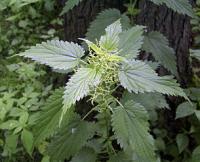
A. Ahangarpour at Diabetes and Physiology Research Centers, Jundishapur University of Medical Sciences in Ahvaz, Iran and colleagues conducted the study in male rats which were subject to a high fructose diet to induce insulin resistance, the hallmark feature of diabetes mellitus type 2, and then treated with a urticadioica leaf extract and found that the extract significantly decreased serum glucose, insulin, low density liprotein (LDL) and leptin, the ratio of LDL/HDL and fasting insulin resistance index, which is good for diabetes mellitus.
According to the authors, urtica dioica medicinal uses have been reported and as a herbal medicine it has been used to treat pertension or high blood pressure, high cholesterol or high blood fat, and diabetes melitus. T he current study was intended to examine how hydroalcoholic extracts of Urtica dioica would affect fructose-induced insulin resistance in male rats.
For the study, 50 male Wistar rats were randomly divided into five groups including control group receiving a placebo, fructose group and three extract groups received 10% fructose for eight weeks. 10% of total energy from fructose is commonly seen in a Western diet. Starting at six weeks, the extract groups received an single injection of 5, 100 or 200 mg extract of urtica dioica daily for two weeks.
As a result, daily administration of fructose was correlated with a significantly increased fasting insulin resistance index, blood glucose and insulin and significantly decreased leptin. T he urtica dioica supplement was associated with significantly decreased serum glucose, insulin, LDL and leptin, and LDL/HDL ratio and FIRI.
In addition, the urtica dioica extract was associated with significantly increased serum triglycerides, very low density lipoprotein, and alanin trasaminase.
The researchers concluded "We suggest that Urtica dioica extract, by decreasing serum glucose, and FIRI, may be useful to improve type 2 diabetes mellitus. Also, by positive effect on lipid profile and by decreasing effect on leptin, it may improve metabolic syndrome."
In another study released recently in Biochim Biophys Acta, researchers in Argentina found lipoic acid as a treatment may also be used to help fight insulin resistance in diatebes mellitus patients.
M.C. Castro of CENEXA, Centro de Endocrinología Experimental y Aplicada, UNLP-CONICET LA PLAT A, Centro Colaborador OPS/OMS in La Plata, Argentina and colleagues tested lipoic acid in rats on a fructose-rich diet and found that the dietary supplement may help fight diabetes mellitus type 2.
For the study, the researchers kept rats on either a standard diet or a fructose rich diet with or without R/S/-alpha-lipoic acid and found rats eating the fructose rich diet with R/S/-alpha-lipoic acid supplemented prevented hiperinsulinemia, hypertriglyceridemia and insulin resitance, which are sufficient to suggest that this lipoic acid supplement can help type 2 diabetes mellitus.
Additionally, the lipoic acid supplementation in the rats on the fructose rich diet also improved hepatic insulin sensitivity an glucose tolerance and reduced hepatic oxidative stress induced by the fructose-rich diet while increasing antioxidant capacity and antioxidant enzyme production.
An estimated 26 million Americans live with diabetes mellitus which is a disease caused by an inadequate diet and or lifestyle. Studies have shown curcumin in a dose of six grams per day and Cinnamon and bitter melon can help effectively prevent prediabetes from developing into full-blown type 2 diabetes mellitus.





